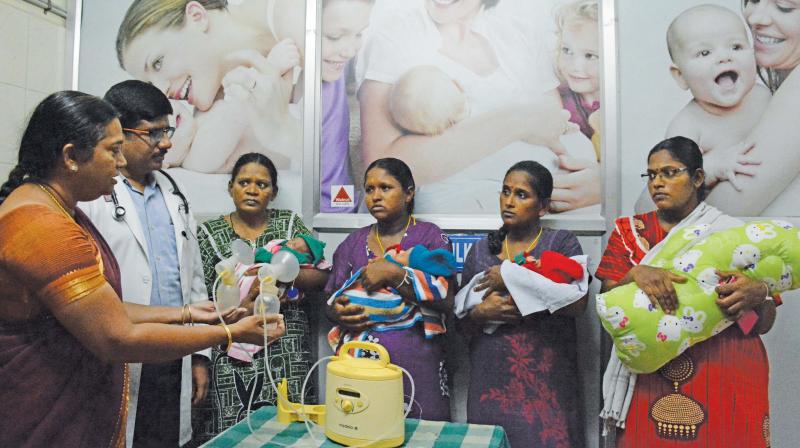Optimal breastfeeding will help mom, child: Doctors

Chennai: World Breastfeeding Week is celebrated every year from August 1 to 7 to raise awareness about the countless benefits of mother's milk and encourage breastfeeding. Mother's milk is not only a complete balanced nutrition for a newborn, but it is also a living dynamic fluid containing immune cells, immunoglobulins, hormones, probiotics and growth factors.
"Breast milk consists of long-chain unsaturated fatty acids which aid in the optimal brain development of the baby. This will improve the vision of the baby, prevent ear infections and gastroenterological diseases. Breastfeeding is also beneficial for the mother as it decreases the risk of mothers developing breast cancer, ovarian cancer, uterine cancer, type 2 diabetes and helps alleviate postpartum depression," says Dr Rekha Sudarshan, lactation consultant, Rainbow Children's hospital.
Despite the widespread knowledge about the advantages of mother's milk, a study suggests that only 55 per cent of babies are exclusively breastfed during the first six months in India. Misconceptions, incorrect information and societal pressure might be the reason for this, doctors say.
"When labour is interventional, painkillers such as epidural are employed. These drugs might pass into the baby's system and induce sleep in the newborn. Since breastfeeding works on the 'demand and supply' mechanism, when there is not enough stimulation by the baby, the mother will not be able to produce sufficient milk. Normally a new mother starts lactating on the second or third day after childbirth. However, the persistent pressure by family members to feed the newborn makes her question her ability to breastfeed and produce sufficient milk. This is one of the primary reasons why mothers opt for formula milk," says Dr Sonali Shenoy Santhanam, lactation specialist and paediatrician, Motherhood hospital.
Elaborating on this, Dr Premalatha, consultant, gynaecology, Fortis Malar Hospital says, "The early weeks of breastfeeding are really challenging. Increasing breastfeeding rates is not just the responsibility of the mother. It is our collective responsibility to encourage her during this period."
"There is also a general misconception among new mothers about the quantity of milk produced. There should be proper education on this subject," says Dr Rekha Sudarshan, adding that the baby's urine output is a key indicator for the baby's milk needs, contrary to the popular belief that a crying baby is in need of milk.
Hospitals too should encourage the practice and conceive policies supportive of breastfeeding. It is the responsibility of doctors to reduce formula milk dependence among new mothers, say doctors. "You can sometimes hear a nurse or doctor say that the baby might need formula milk because of its bigger size. This is completely untrue. The medical community, as well as the public, should be given the right information. Formula milk should be used only if medically prescribed and there should be proper documentation of the data as to why formula milk was advised," notes Dr Sonali.
Doctors also say community and family support go a long way in helping new mothers. Speaking about this, Dr Jayashree Jayakrishnan, lactation consultant, Fortis Malar says, "We aim to educate the entire family in order to prepare them to face the pregnancy period and the post-pregnancy phase together. We emphasize that the family gets involved, especially in the post-pregnancy phase in order to help mothers attain optimal breastfeeding."
Doctors at Apollo and motherhood hospitals also plan to conduct ante-natal classes to help mothers understand newborns.

